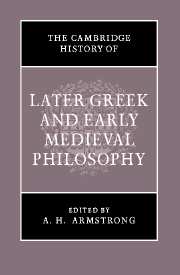Book contents
- Frontmatter
- Chapter 1 Introductory
- Part 1 GREEK PHILOSOPHY FROM PLATO TO PLOTINUS
- Part II PHILO AND THE BEGINNINGS OF CHRISTIAN THOUGHT
- Chapter 8 Philo
- Chapter 9 The beginning of Christian philosophy: Justin: the Gnostics
- Chapter 10 Clement of Alexandria
- Chapter 11 Origen
- Part III PLOTINUS
- Part IV THE LATER NEOPLATONISTS
- Part V MARIUS VICTORINUS AND AUGUSTINE
- Part VI THE GREEK CHRISTIAN PLATONIST TRADITION FROM THE CAPPADOCIANS TO MAXIMUS AND ERIUGENA
- Part VII WESTERN CHRISTIAN THOUGHT FROM BOETHIUS TO ANSELM
- Part VIII EARLY ISLAMIC PHILOSOPHY
- Select Bibliography
- Additional Notes and Bibliography
- Index of ancient and medieval works referred to in the text
- General Index
- Index of Greek terms
- References
Chapter 11 - Origen
from Part II - PHILO AND THE BEGINNINGS OF CHRISTIAN THOUGHT
Published online by Cambridge University Press: 28 March 2008
- Frontmatter
- Chapter 1 Introductory
- Part 1 GREEK PHILOSOPHY FROM PLATO TO PLOTINUS
- Part II PHILO AND THE BEGINNINGS OF CHRISTIAN THOUGHT
- Chapter 8 Philo
- Chapter 9 The beginning of Christian philosophy: Justin: the Gnostics
- Chapter 10 Clement of Alexandria
- Chapter 11 Origen
- Part III PLOTINUS
- Part IV THE LATER NEOPLATONISTS
- Part V MARIUS VICTORINUS AND AUGUSTINE
- Part VI THE GREEK CHRISTIAN PLATONIST TRADITION FROM THE CAPPADOCIANS TO MAXIMUS AND ERIUGENA
- Part VII WESTERN CHRISTIAN THOUGHT FROM BOETHIUS TO ANSELM
- Part VIII EARLY ISLAMIC PHILOSOPHY
- Select Bibliography
- Additional Notes and Bibliography
- Index of ancient and medieval works referred to in the text
- General Index
- Index of Greek terms
- References
Summary
Origen was born about 184–5 at Alexandria, probably of Christian parents (Porphyry and Eusebius contradict one another on this point). When he was nearly seventeen his father was martyred in the persecution of Severus in 202/3, and the event left a deep mark on Origen's mind. He always writes with an impassioned sense of belonging to a church called to fearless martyrdom and resistance to all compromise with the world which ever threatens it at least as much by the infiltration of merely nominal belief as by external attack and persecution. With this attitude there goes a strongly world-denying strain of personal detachment and ascetic self-discipline, symbolized in the story, told by Eusebius from hearsay and possibly true, that in the zeal of youth Origen took literally Matt. xix. 12 and castrated himself. He lived on the minimum of food and sleep, and took seriously the gospel counsel of poverty.
For a time he studied Greek philosophy in the lecture room of Ammonius Saccas, with whom Plotinus was later to study for eleven years. Ammonius is a mysterious figure. All we know of him probably comes directly or indirectly from Porphyry who describes in his life of Plotinus how Ammonius' esoteric teaching fired Plotinus with a (typically Neopythagorean) desire to investigate the antique wisdom of Persian and Indian sages. But it is a forlorn and foolish undertaking to attempt a reconstruction of Ammonius' metaphysical doctrines by looking for synoptic elements common to Origen and Plotinus. It is impossible to determine what, if anything, Origen really drew from Ammonius. What is certain is that Origen possessed an exhaustive comprehension of the debates of the Greek schools and that to his contemporaries he stood out as an intellectual prodigy.
- Type
- Chapter
- Information
- Publisher: Cambridge University PressPrint publication year: 1967



